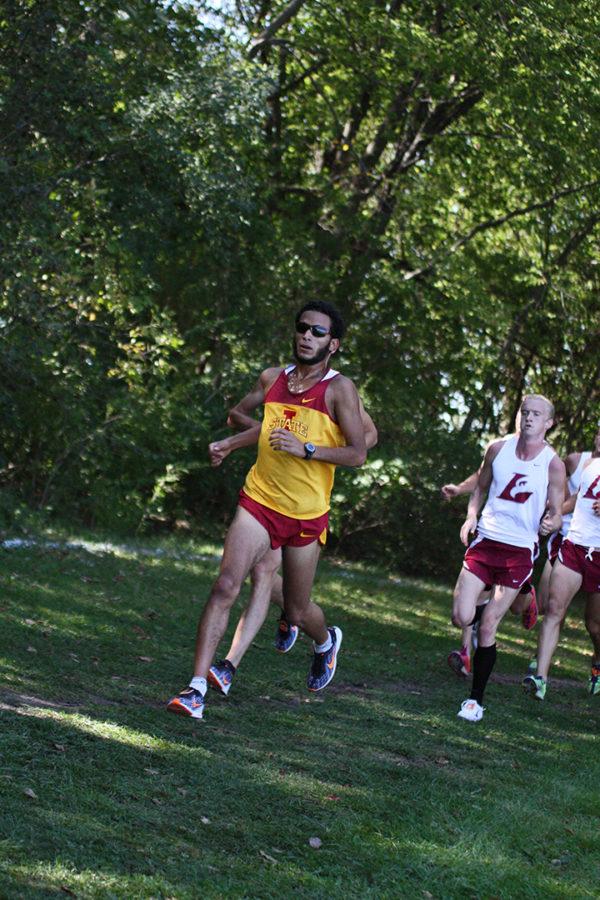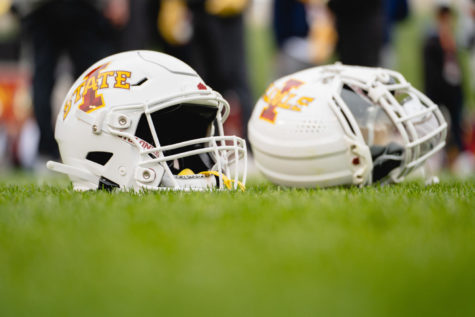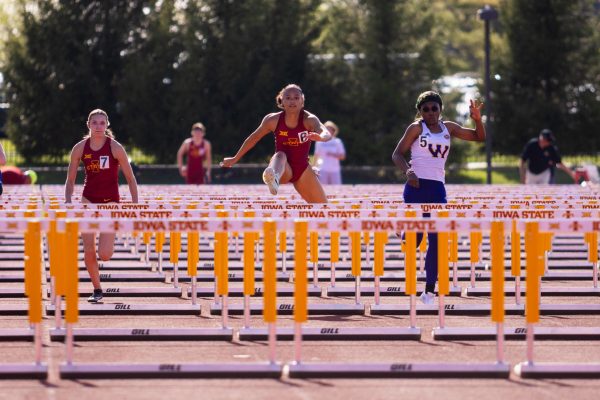Hrezi begins to make his mark
Photo: Katie Hansen/Iowa State Daily
Junior cross-country runner Mohamed Hrezi heads toward the finish line, Saturday, Sept. 15, at the Iowa Intercollegiate cross-country meet in Ames.
September 26, 2012
It did not take long for junior and first-year cross-country runner Mohamed Hrezi to make an impact on the ISU cross-country team. In fact, it took Hrezi just his first race: a first-place finish on Sept. 15 at the Iowa Intercollegiate.
Hrezi’s teammates and coaches — who use words like “tough,” “motivated,” “flamboyant” and “energetic” to describe him — will tell anyone they believe he is just beginning to scratch the surface of his potential as a cross-country runner.
“We joke about it on a daily basis with him,” said assistant coach Travis Hartke. “But he’s going to be really, really good in cross-country.”
Hrezi, the oldest of six children of Libyan natives Fuad Hrezi and Hanadi Eskoni, grew up primarily in Connecticut.
Mohamed’s father first came to the United States to get a degree in computer science.
After getting his degree, he returned to Libya to marry Mohamed’s mother.
They then both moved back to the states, where Hrezi was born.
Mohamed’s parents and four sisters have recently moved back to Libya’s capital city Tripoli, but for a long time Mohamed said his father “never wanted to go back that often.”
“The biggest problem was the old dictator [Muammar Gadhafi],” Mohamed said. “My dad never wanted to go back because you could be in the airport, and they just like pick you up and throw you in jail for the rest of your life, and you have no idea why.”
Mohamed also said his parents and sisters are just now becoming acclimated to their new home after making the jump from Connecticut.
Mohamed and his younger brother, Muad, both stayed in the United States.
Mohamed is at Iowa State while his brother attends the University of North Carolina, where he runs for the Tar Heels’ cross-country and track teams.
His first experience with running, Mohamed said, came in middle school where he ran on the cross-country team for fun and for the social aspect of the sport.
“I was dead last every meet. I was not that good at all,” Mohamed said with a laugh, while recalling his first year.
Mohamed would go on to become a top competitor on Naugatuck High School’s track team in the 400- and 800-meter events.
After high school, Mohamed attended Central Connecticut State, where he studied accounting and ran cross-country and track.
“I barely did cross-country — I was on the team, but I wasn’t really productive at all,” Mohamed said. “I was strictly 800-meters.”
In his first year running for Central Connecticut, Mohamed set multiple personal records for himself.
But after a coaching change with the track team, he found his times becoming worse and worse.
“I talked to my father and was like: ‘Dad, this isn’t working out,’” Mohamed said.
His father encouraged him to seek out another school — one that was better than Central Connecticut.
Texas was Mohamed’s first choice for college, but after discovering he would have to retake a whole year of general education classes and maintain a 3.5 GPA to get into the university’s College of Business, he decided to return home.
At that same time, Hartke was recruiting Mohamed’s brother to Iowa State. Muad informed Hartke about the situation with Mohamed.
“I kind of stumbled upon him,” Hartke said, “I didn’t get [Muad], but I got [Mohamed].”
Mohamed arrived in Ames last January and competed in both indoor and outdoor track for the Cyclones.
“I’ve never trained this hard in my life,” Mohamed said.
Individually, Mohamed hopes to eventually qualify for the Olympics.
“I like to think that every runner, if you’re running in college, your goal is ultimately to make the Olympics,” Mohamed said.
With his dual-citizenship, that would mean possibly needing to make a choice between running for the United States or Libya.
“To be honest with you, it would probably be one of the toughest decisions I’d have to make in my life, if I had to make that decision,” Mohamed said. “I don’t really give that much thought. Let me just get there first, and I’ll worry about that later.”

















